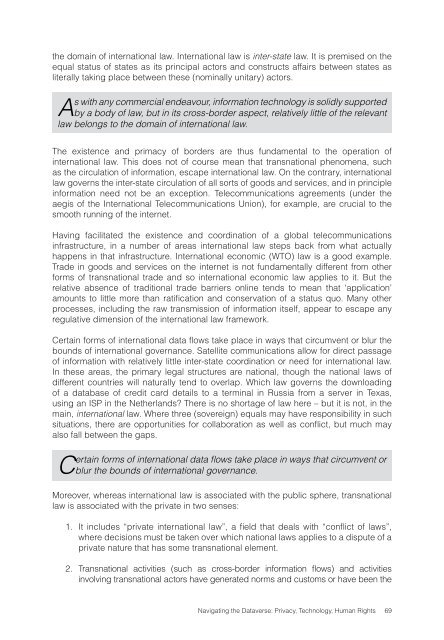Navigating the Dataverse: Privacy, Technology ... - The ICHRP
Navigating the Dataverse: Privacy, Technology ... - The ICHRP
Navigating the Dataverse: Privacy, Technology ... - The ICHRP
You also want an ePaper? Increase the reach of your titles
YUMPU automatically turns print PDFs into web optimized ePapers that Google loves.
<strong>the</strong> domain of international law. International law is inter-state law. It is premised on <strong>the</strong><br />
equal status of states as its principal actors and constructs affairs between states as<br />
literally taking place between <strong>the</strong>se (nominally unitary) actors.<br />
As with any commercial endeavour, information technology is solidly supported<br />
by a body of law, but in its cross-border aspect, relatively little of <strong>the</strong> relevant<br />
law belongs to <strong>the</strong> domain of international law.<br />
<strong>The</strong> existence and primacy of borders are thus fundamental to <strong>the</strong> operation of<br />
international law. This does not of course mean that transnational phenomena, such<br />
as <strong>the</strong> circulation of information, escape international law. On <strong>the</strong> contrary, international<br />
law governs <strong>the</strong> inter-state circulation of all sorts of goods and services, and in principle<br />
information need not be an exception. Telecommunications agreements (under <strong>the</strong><br />
aegis of <strong>the</strong> International Telecommunications Union), for example, are crucial to <strong>the</strong><br />
smooth running of <strong>the</strong> internet.<br />
Having facilitated <strong>the</strong> existence and coordination of a global telecommunications<br />
infrastructure, in a number of areas international law steps back from what actually<br />
happens in that infrastructure. International economic (WTO) law is a good example.<br />
Trade in goods and services on <strong>the</strong> internet is not fundamentally different from o<strong>the</strong>r<br />
forms of transnational trade and so international economic law applies to it. But <strong>the</strong><br />
relative absence of traditional trade barriers online tends to mean that ‘application’<br />
amounts to little more than ratification and conservation of a status quo. Many o<strong>the</strong>r<br />
processes, including <strong>the</strong> raw transmission of information itself, appear to escape any<br />
regulative dimension of <strong>the</strong> international law framework.<br />
Certain forms of international data flows take place in ways that circumvent or blur <strong>the</strong><br />
bounds of international governance. Satellite communications allow for direct passage<br />
of information with relatively little inter-state coordination or need for international law.<br />
In <strong>the</strong>se areas, <strong>the</strong> primary legal structures are national, though <strong>the</strong> national laws of<br />
different countries will naturally tend to overlap. Which law governs <strong>the</strong> downloading<br />
of a database of credit card details to a terminal in Russia from a server in Texas,<br />
using an ISP in <strong>the</strong> Ne<strong>the</strong>rlands? <strong>The</strong>re is no shortage of law here – but it is not, in <strong>the</strong><br />
main, international law. Where three (sovereign) equals may have responsibility in such<br />
situations, <strong>the</strong>re are opportunities for collaboration as well as conflict, but much may<br />
also fall between <strong>the</strong> gaps.<br />
Certain forms of international data flows take place in ways that circumvent or<br />
blur <strong>the</strong> bounds of international governance.<br />
Moreover, whereas international law is associated with <strong>the</strong> public sphere, transnational<br />
law is associated with <strong>the</strong> private in two senses:<br />
1. It includes “private international law”, a field that deals with “conflict of laws”,<br />
where decisions must be taken over which national laws applies to a dispute of a<br />
private nature that has some transnational element.<br />
2. Transnational activities (such as cross-border information flows) and activities<br />
involving transnational actors have generated norms and customs or have been <strong>the</strong><br />
<strong>Navigating</strong> <strong>the</strong> <strong>Dataverse</strong>: <strong>Privacy</strong>, <strong>Technology</strong>, Human Rights 69
















